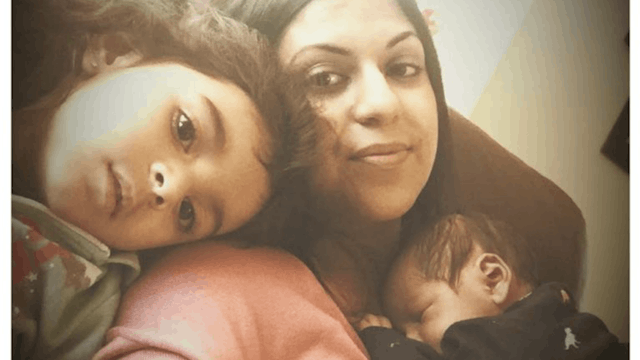This Is What Postpartum Depression Took From Me

When my daughter Maliha was born, it was blissful. I had a few days of just the normal baby blues but other then that, it was the most euphoric feeling I have ever experienced in my entire life. After healing from a not planned C-section, I settled into the routine of motherhood with ease, carefully following a book on schedules, breastfeeding and feeling pride when I saw that Maliha had gained ounces from a feeding.
Every morning started out with a smile from my girl, a feeding, followed by a nap that we would take together. Maliha was such a good baby, patiently waiting and watching me while I got dressed for the day. We would go out to the family room and kitchen, and I’d be singing and playing songs on Pandora. It was amazing. So when I was pregnant with Issah, I again waited for this bliss.
Oh, how very wrong I was.
It started out just fine. This time, the C-section was planned and not so traumatic as the first. That itself should have set the bar high. I recovered much faster and had more experience with handling newborn. I came home, waited for my milk to come in, breastfed, tried to rest and keep the baby happy. But something was horribly off.
Every moment of happy and cuteness came with sadness. I struggled to laugh, to smile. I looked at Maliha and desperately wanted to go back to her babyhood–I thought I wasn’t paying enough attention to her and it killed me inside. Issah was such a cute baby, but he was colicky. I felt so bad for him every time the sun set each evening and he would cry and scream, no matter what I did.
There I was, surrounded by my two children and husband, and I had never felt more alone in my life.
My anxiety was sky high, which especially was not eased as it was cold and flu season. At the end of every day, I would wipe down toys and furniture and even the TV and remotes with anti-bacterial wipes. Everything had to be perfect, not a toy out of place, not a dish in the sink, not a crumb on the counter. I struggled so badly for some kind of control amid all the chaos going on in my mind.
I looked through my phone of pictures with Maliha when she was a baby. I had so many of myself with her, documenting on happiness. I didn’t have many with Issah at all. So I attempted to take a few.
Mariam Hussain
Even in color, this photo looked depressing. I made it black and white and all I could think was, This is the definition of postpartum depression. I am struggling to smile, to look happy. I have an innocent and sweet baby sleeping on me. He’s not crying at this moment. It was a peaceful part of the day so I should have been happy, right? I was MISERABLE.
People have said not to be afraid or ashamed to get help for postpartum depression. Shame or fear was not my problem though. I struggled just to talk. I can’t count how many times I sat at the dinner table with my little family, just crying while my husband and daughter looked at me helplessly. Maliha would give me a hug and pat my hand while looking at her dad like, “Here she goes again.”
Even when I did finally go to the doctor, all I said was “I’m not happy and can’t smile.” I said this without much emotion. I was given a prescription for an antidepressant, which made me sick so I soon stopped taking it. Eventually, after a few months, the fog started to lift. It wasn’t something that took over the entire day. Maybe a few moments here and there.
Issah is now 8 months old and I still have these moments from time to time, but it’s nowhere near where it was. I am one of the lucky ones. My postpartum depression improved without much medical intervention. And I personally don’t think the level of my depression was very high. My heart goes out to the millions of women who struggle for years with depression much worse than mine.
I implore you to get help in whatever form you can. If you cannot articulate what’s going on, take someone with you — your husband, partner, a friend. Write it in a note and hand it to your doctor.
I never thought I would have trouble voicing what was wrong, but it was part of the struggle. I didn’t want to talk. It was a horrible feeling that left me drained. Because being a mother is hard enough, we should all do what we can to make it easier on ourselves.
This article was originally published on